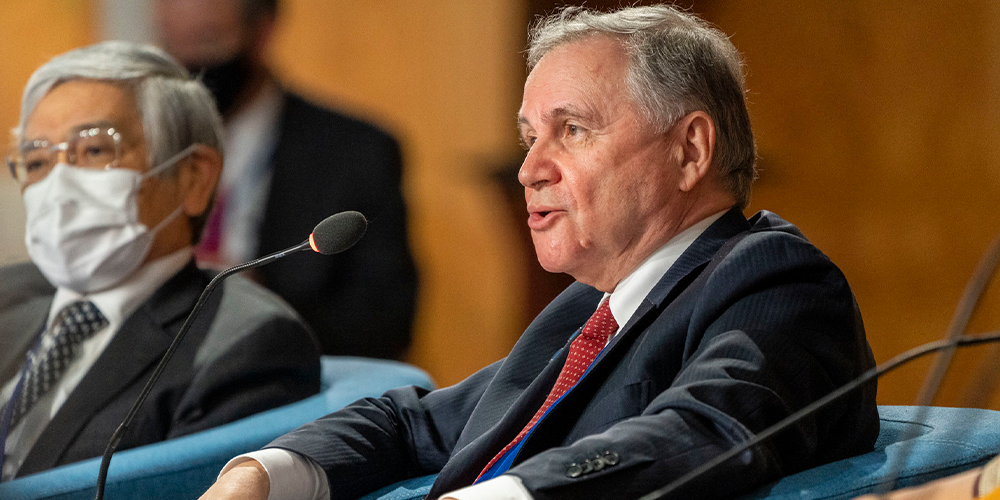On 3 November, OMFIF hosted Ignazio Visco, governor of the Banca d’Italia, to speak on the economic outlook in Italy and monetary developments in the euro area and beyond. In conversation with OMFIF Chairman David Marsh, Visco discussed the biggest macroeconomic challenges faced by policy-makers, as gas prices and the war in Ukraine add to inflation and slow growth globally. Despite this gloomy outlook, he noted relative bright spots in the Italian economy from services, tourism and the labour market offering a growth spurt, suggesting for Italy one of the ‘better’ 2022 scenarios – with inflation remaining the primary concern.
On the drivers of inflation, Visco maintained that there is a difference between the euro area and US, with excess demand more apparent in the latter. While the European Central Bank has moved swiftly to anchor inflation expectations – moving the deposit rate from negative to positive territory – it should not be assumed that 75 basis points jumps are necessarily becoming the norm.
Visco maintained that the ECB should be ‘gradual but continuous’ on rate increases, finding references to ‘neutral’ policy rates unhelpful. ‘I don’t think we should expect really to react to the way the Fed has done [rate hikes],’ he stated, emphasising that decisions are taken meeting by meeting to achieve the twofold objectives of avoiding inflation expectations de-anchoring and preventing a prolonged economic contraction. He noted the regression impact of ‘inflation is a tax that we all have to pay and this tax should probably be redistributed,’ but cautioned that this should be done in a targeted way so as not to flame inflationary pressures.
Regarding the ECB’s balance sheet, ‘the first line of defence is flexibility in the pandemic emergency purchase programme’ scheme. On the new transmission protection instrument, Visco asserted that if policy-makers intervene to mitigate market crises, the mechanism under which the TPI is used has to be permanent and needs to be based more on monetary stability rather than political developments. In the face of inflation expectations de-anchoring and financial stability risks, he emphasised the need for a ‘steady hand and a cool head’ on monetary normalisation. At least in the short term, Visco acknowledged that central banks will now be making small or no profits — and that this is something governments will have to accept in view of the large profits that central banks have paid over to finance ministries in previous years.
Reasonably relaxed over increasing government debt costs, Visco said that he does not anticipate rate hikes having ‘major effects on the burden of the debt of any country’. Nominal rates have gone up globally, but real rates remain negative at a time when the debt burden, with an average maturity of around eight years, is manageable. Italy’s net external position remains strong and household debt to gross domestic product ratios are one of the lowest in the euro area. For policy-makers, fiscal moderation has to be coupled with increased growth potential (for example through productivity gains) and early discussions with the Meloni government on such things as Next Generation European Union funds are ‘so far, so good’. The new government ‘does not seem to be on a different path’ to the previous one led by Mario Draghi.
Regarding the other new monetary tightening tool, targeted longer-term refinancing operation rates are now becoming less attractive, but banks have benefitted from higher rates and customer deposits. They now have to worry about the real economy risk: how much will nonperforming loans have to rise and how much will banks provision for them?
Watch the whole conversation here.
Neil Williams is Chief Economist and Taylor Pearce is Economist at OMFIF.
Image source: International Monetary Fund.
